The city will take on $19.3 million in debt to fund the long-awaited rebuild of the Riverside Dam starting in 2025.
That cost will translate into a 1.36 per cent annual tax impact that will last 15 years once the city begins repaying the debt.
Coun. Corey Kimpson tabled the motion to add the project back into the city's 10-year capital schedule during Thursday's budget and audit committee meeting, a month after it was revealed the failing dam requires an immediate $200,000 repair.
The decision comes almost five years after council voted to rebuild the Riverside Dam in June 2018.
The project was scheduled to begin in 2022 and was originally budgeted at $5.4 million.
The cost ballooned to $15.2 million in 2019 due to necessary add ons, including sluice gates and valves for flood and sediment control, a fish ladder, fencing, signs and river barriers.
Faced with greater demand to go ahead with the Preston Memorial Auditorium expansion in December 2021, council voted to undertake a passive management approach instead, monitoring the 130-year-old dam at an annual projected cost of $30,000.
But with the dam failing rapidly, a $200,000 repair now will only delay the inevitable, council concluded.
Kimpson said the dam and the mill pond are integral to the city's placemaking efforts and provide an accessible place for Preston residents to enjoy the river.
Continuing to provide band-aid fixes could lead to the dam failing and we could end up with bigger messes to clean up down the road, she said. A breach could release contaminated sediment downstream.
She suggested funding some of the dam project using the city's core area improvement fund, which provides money for placemaking projects.
But Coun. Mike Devine admitted he has mixed emotions about the project knowing how dams on the city's two rivers has interfered with fish habitat.
"These dams were built to help drive the wheels of industry, nothing more, nothing less," he said. "They've done a great deal of damage to the environment. They've done a great deal of damage to the cold water fishery."
Devine said after voting in favour of the dam project in 2018, he's come to second guess that decision.
Mayor Jan Liggett, however, said she stands by her support of the project, believing any further delays in getting the dam rebuilt will only add to the city's costs.
"It was only delayed because of budget reasons, it wasn't delayed because of a change of minds," she said, adding it's time to "get on with the job."
Dams are a good reminder of where we started from as a country, she said, adding she's worried the notion that old buildings are only "aesthetics and we don't need them" is starting to creep into other planning decisions.
"If we start to lose that, we lose our history. The Indigenous history is important but also the history of our ancestors."
"It's not just aesthetics. It's heritage and history," she said.
Councillors learned the alternative to rebuilding the dam isn't much better in terms of cost.
Naturalizing the dam would require the city to reopen the environmental assessment at an estimated cost of $600,000.
That would be followed by a design project to get to the same level as the rebuild, which is 60 per cent into the design phase. Both of those stages would take between five and six years to complete.
The city's director of engineering Kevin De Leebeeck said it would bring the overall cost to naturalize the Speed River in Preston to about $17 million in 2029.
He had no estimate on the ongoing management costs for the river once it's naturalized, but there will be an ongoing cost to maintain the sluice gates and fish ladder.
Coun. Ross Earnshaw worried the city will be bumping its head on its self-imposed debt ceiling by taking on an additional $19 million in debt for the dam.
Showing a graph that compared Cambridge to other municipalities, CFO Sheryl Ayres confirmed the city will far exceed its own limit of 10 per cent tax and growth funded debt by hitting close to 15 per cent in 2027.
Cambridge is currently in line to have the highest tax debt limit of all lower tier Ontario municipalities with populations greater than 100,000 once costs of the new rec complex and dam are added in.
Debt per capita at the 2027 peak will be about $1,200 for every Cambridge resident, Ayres said. The average debt per capita ratio for lower tier Ontario municipalities is around $250.
Liggett thanked Ayres for the comparison but said those municipalities could be looking at "sky high" budgets that will completely change things after this year.
"I don't think we should be looking at a graph that we don't know whether it's true or not," she said.
"We're going to have to debt finance even if we remove it."
Coun. Nicholas Ermeta said the practical reason for keeping all the city's dams is gone but understands "the reasons for having things change."
"I am comfortable we can move forward financially," he said.
Coun. Adam Cooper agreed with Ermeta and Kimpson on the idea the Riverside dam has become part of the culture of the community and should be valued for the aesthetic contribution it provides.
"This can has been kicked a lot and I believe we need to stop the kicking and take some action," he said.
Thursday's vote to move forward with the rebuild ended 6-2 in favour, with councillors Devine and Scott Hamilton voting against it.
Council is set to ratify the decision during final 2023 budget deliberations Feb. 21.
